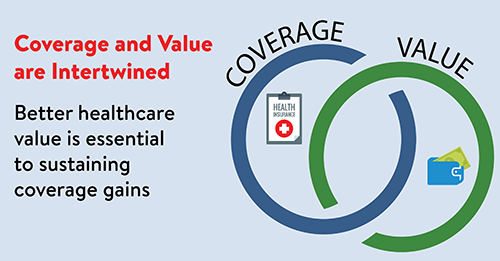Improving Value
Healthcare Coverage and Value are Intertwined
For three reasons, broad access to coverage and getting better value out of our health system are inseparable, intertwined policy objectives.
- Coverage is the top factor in improving access to care, coordination of care and quality outcomes-all goals associated with health system transformation.1
- Better healthcare value is essential to sustaining coverage gains.2
- Reforms designed to produce better value (e.g., provider payment reform) rely on a population with coverage.3
Therefore, we need to harmonize these policy spheres if we are to reach our nation’s shared goal of access to quality healthcare for all and efficient spending.
Cost is the most common reason cited for being uninsured.4 States should consider the following policy approaches:
- Medicaid expansion to 138% of FLP.
- Supplemental premium subsidies, reinsurance, Medicaid Buy-In, Basic Health Plan or other options for families that make too much to qualify for Medicaid.
- Coverage options for recent or undocumented immigrants.
- Strong rate review for fully insured, private market coverage options.

Notes
1. Uninsured people are Less likely to receive medical care; More likely to die early; More likely to have poor health status: What Is the Link Between Having Health Insurance and Getting Adequate Health Care?, August 1, 2011, RWJF Health Policy Snapshot Series. Moreover, underinsured people behave like uninsured people, often failing to get needed healthcare: Collins, Gunja, Doty, How Well Does Insurance Coverage Protect Consumers from Health Care Costs? Findings from the Commonwealth Fund Biennial Health Insurance Survey, 2016, Commonwealth Fund, October 2017.
2. Jeremy P. Ziring, et al., Coverage Expansion and Delivery System Reform in the Safety Net: Two Sides of the Same Coin, NEJM Catalyst, October 18, 2017
3. Ibid.
4. Tolbert, Jennifer, et al., "Key Facts About the Uninsured Population," Kaiser Family Foundation (December 2019).






